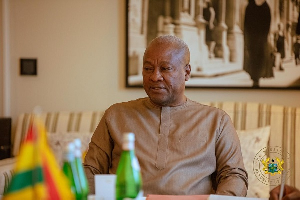Kumasi, April 11, GNA - Some 15 districts in the Ashanti region are to benefit from a total of 1,000 boreholes under Phase IV of the Rural Water and Sanitation Project.
In addition, 2,000 sanitary facilities would be provided in those areas.
Mr Sampson Kwaku Boafo, Ashanti Regional Minister, announced this at the regional launch of the project in Kumasi on Monday.
During the previous three phases, 350 boreholes fitted with pumps were sunk in five districts of the region.
Brong-Ahafo, Western, Eastern and Volta regions are also to be covered under this project, funded with a German government grant of 10
million Euro. Mr Boafo said the district assemblies and beneficiary communities would contribute at about 10 percent of the capital cost.
He warned that the Regional Co-ordinating Council (RCC) would sanction assemblies that default in the payment of their contributions. The Regional Minister noted that by paying a token to support the project, the communities would develop a sense of ownership of the facilities and thereby take good care of them.
Mr Robert K.D. Van-Ess, Director Technical Services of the Community Water and Sanitation Agency, implementers of the project, said to ensure the attainment of the Millennium Development Goals (MDGs), the Agency had prepared a Strategic Investment Plan covering the period 2005-2015 for both water and sanitation delivery to rural communities and small towns in Ghana.
Under it, provision of water and sanitation facilities to these areas would increase from the present coverage of about 52 percent to 85 percent for water and 85 percent from 30 percent for sanitation. The financial requirement to meet the targets is around 750 million dollars or an annual investment of 68 million dollars.
He said achieving the target of the MDG would require the drilling of about 15,000 boreholes and construction of about 1,800 piped schemes over the next 10 years.
Mr Van-Ess noted that groundwater which is the priority source development for their activities has not been without problem as iron, manganese and fluoride have come up as major water quality challenges. The other challenges, he said, had to do with the long-term sustainability of the projects.
Regional News of Monday, 11 April 2005
Source: GNA
















